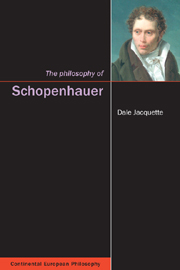Book contents
- Frontmatter
- Contents
- Dedication
- Preface
- Acknowledgements
- A note on texts and terminology
- Abbreviations
- Introduction: Schopenhauer's life and times
- 1 Schopenhauer's idealism
- 2 Empirical knowledge of the world as representation: from natural science to transcendental metaphysics
- 3 Willing and the world as Will
- 4 Suffering, salvation, death, and renunciation of the will to life
- 5 Art and aesthetics of the beautiful and sublime
- 6 Transcendental freedom of Will
- 7 Compassion as the philosophical foundation of morality
- 8 Schopenhauer's legacy in the philosophy of Nietzsche, Heidegger and the early Wittgenstein
- Notes
- Bibliography and recommended reading
- Index
2 - Empirical knowledge of the world as representation: from natural science to transcendental metaphysics
- Frontmatter
- Contents
- Dedication
- Preface
- Acknowledgements
- A note on texts and terminology
- Abbreviations
- Introduction: Schopenhauer's life and times
- 1 Schopenhauer's idealism
- 2 Empirical knowledge of the world as representation: from natural science to transcendental metaphysics
- 3 Willing and the world as Will
- 4 Suffering, salvation, death, and renunciation of the will to life
- 5 Art and aesthetics of the beautiful and sublime
- 6 Transcendental freedom of Will
- 7 Compassion as the philosophical foundation of morality
- 8 Schopenhauer's legacy in the philosophy of Nietzsche, Heidegger and the early Wittgenstein
- Notes
- Bibliography and recommended reading
- Index
Summary
We also find physics, in the widest sense of the word, concerned with the explanation of phenomena in the world; but it lies already in the nature of the explanations themselves that they cannot be sufficient. Physics is unable to stand on its own feet, but needs a metaphysics on which to support itself, whatever fine airs it may assume towards the latter.
(WWR 2: 172)Scientific explanation
It is only after Schopenhauer has explained the basic principles of his transcendental idealism that he turns, first, to the question of empirical knowledge of the world as representation, and secondly to thing-in-itself in the transcendental metaphysics of the world as Will. This order of topics is appropriate to Schopenhauer's exposition, given his thesis that the only correct philosophical methodology is to begin, not with either the object, in the manner of pure materialists, nor with the subject, as in Fichte's purely subjective idealism, but with representations that are theoretically analysable into interpresuppositional ontically inseparable subject and object. Schopenhauer is now prepared to begin a detailed investigation of the empirical world as representation, to be followed by an analysis of thing-in-itself as Will.
The world as representation for Schopenhauer is the realm where the principium individuationis and fourfold root of the principle of sufficient reason apply. It is also where epistemic criteria of empirical knowledge concerning the world of appearance that are falsely assumed by materialists and naive realists to constitute the only truths about the world find their proper place.
- Type
- Chapter
- Information
- The Philosophy of Schopenhauer , pp. 40 - 70Publisher: Acumen PublishingPrint publication year: 2005



